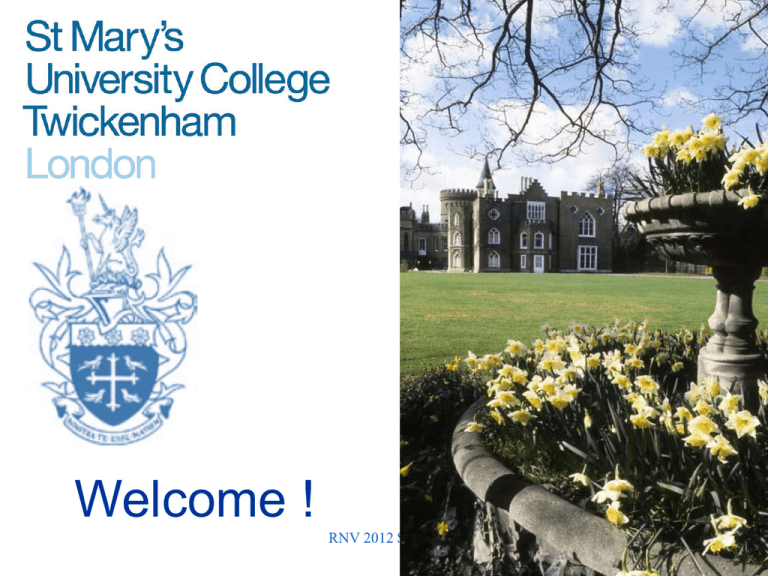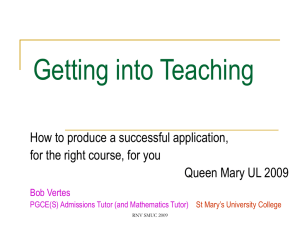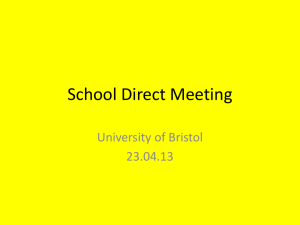St Mary`s College
advertisement

Welcome !
RNV 2012 SMUC
PGCE Presentation
“Getting into teaching”
Thank you for taking part today
RNV 2012 SMUC
Issues for today’s session
• What are the choices you need to make when
considering teaching as a career?
• What makes up a PGCE course?
• What do you have to do to make a successful
application for teacher training?
• Your questions
RNV 2012 SMUC
What choices?
• Assuming you are a graduate (or soon will be):Choose your phase. Assessed across 2 consecutive Key Stages for
QTS; post-compulsory (now can, but may not, lead to teaching in school)
Choose your style of course: PGCE,SD,SD(S),TF,SCITT
Training ( HEI or school) or via employment in school; full-time or flexible
Choose your subject specialism(s). Relevant degree? Degree
class? (Shortage) Subject Knowledge Enhancement course?
Choose your provider GTTR application is sequential (for 2013)
Choose your timing Primary 6 Dec; Secondary 30 Jun? Defer?
Choose your referee Emailed reference; academic or line manager
RNV 2012 SMUC
Some Myths
Teaching primary children is easier than teaching secondary
Teaching is just a 9-4 job
Teaching has long holidays with no work to do
Schools and classrooms today are unruly places
If I go into teaching I will be stuck in it for life
To be a good teacher you just have to know your subject
Teaching in a sixth-form college or FE is just teaching A level
Teachers are badly paid
The biggest myth:
I know what teaching in 21st century English schools involves
from my parents/friends/schooling/tutoring/coaching/TEFL (etc.)
RNV 2012 SMUC
A Warning
The PGCE training year course will very likely be
the toughest year of your life:demanding intellectually, physically, emotionally …
(and, now, perhaps financially?)
but possibly the most interesting, fruitful, challenging!
you will make friends for life,
and really learn how to learn (great for parenting, too)
Every day will bring different experiences.
RNV 2012 SMUC
For the PGCE or other ITT course
Minimum academic entry requirements:
(as set down by the Teaching Agency and Department for Education)
These MUST have been obtained before starting any teacher training course.
1. A recognised awarded degree (from 2012, 3rd or above, if to
be eligible for fee funding; 2.2 or above to be eligible for bursary)
2. GCSEs [or recognised equivalents]
– Grade C English Language & Mathematics (for everyone)
– Grade C Science (for Primary candidates) - - {[we also ask this for PE]
Some providers ask for these to have been obtained pre-application for competitive
Secondary subjects and for Primary courses.
•
•
•
N.B. Some ‘GCSE Equivalents’ are not recognised as sufficient for Teacher Training, only for undergraduate
entry. Each provider’s Registry makes final decisions on these.
NARIC can advise re degree and GCSE recognition, and should be consulted if in any doubt
Irish Leaving Certificate Honours D, Ordinary C are normally accepted equivalents.
RNV 2012 SMUC
Fitness to teach
• Applicants should note that there are criminal record and health (fitness to
teach) checks that will need to be carried out, the former with the Criminal
Records Bureau, for which there is a charge, currently around £40. (Garda in
Ireland) .
• DfE regulations will disqualify candidates with certain health conditions
and convictions. Any such issues need to be raised before application,
on the application form and certainly in the interview.
• You will need a new CRB for teaching even if you already possess one
or more for other sensitive work.
• Anyone appointed to a post involving regular contact with children or young
people must be medically fit. It is the statutory responsibility of employers
(and ITT providers) to satisfy themselves that individuals have the
appropriate level of physical and mental fitness before an appointment offer
is confirmed. Your health “Fitness to teach” must be signalled to us from
your doctor before you can register; this is a standard condition of any
place offer, even if otherwise “unconditional”.
RNV 2012 SMUC
Skills tests (from Sep 2012)
• Before being able to start any teacher training course in England you
must take and pass tests in Numeracy and Literacy.
• The tests are computer-based and must be taken at an official
test centre, located in the UK. You’ll need to book in advance.
• Some providers /courses will require you to have passed the tests
before interview; but if not then soon after. Plan to take them as soon
as you have applied for teacher training, and are ready. Preparation
for tests will be important. Practice tests are available online.
• The first attempt at each test is free. Two more attempts,
each charged at £19.25 are allowed. Failing a test 3 times bars you
from retaking, and from applying for teacher training, for 2 years.
• From Sep 2013 there will also be a reasoning test to take
RNV 2012 SMUC
Non-cognitive tests (from Sep 2012)
• The Government is encouraging providers to include
a test assessing applicants’ personality and
professional competence for teaching as part of
any teacher training selection process.
• For some providers this will involve an online
assessment questionnaire, at an authorised test
centre in the UK, likely to be taken before interview.
• This is so new that procedures and costs have yet to
be determined. Check with your chosen providers.
RNV 2012 SMUC
What do teachers do?
PRIMARY TEACHERS
SECONDARY TEACHERS
generally
• Teach learners aged 5-11
• Teach one class for a year
• Teach all National Curriculum
subjects and a broader school
curriculum
• Plan, teach and assess
lessons
• Contribute to management,
e.g. taking responsibility for a
curriculum area
generally
• Teach learners aged 11-19
• Teach a specialist subject (or
sometimes more than one)
• Plan, teach and assess lessons
• Have Pastoral responsibility, e.g.
as form tutor
• Contribute to extra-curricular
activities
RNV 2012 SMUC
PGCE (Full-time) STRUCTURE
•
•
•
•
•
General Professional Studies – at postgraduate level
Curriculum/Subject Specific Studies
Practical Teaching Experiences in 2 different schools
University teacher tutors and partner School mentors
Time in School: (normally a 36 week course, Sep - June/July)
– 24 weeks for primary ; 24 weeks for secondary
• Assessment: through professional development portfolio,
assignments and school experience (no exams!)
• Expectations: professionalism, punctuality and 100%
attendance; willingness to work significantly beyond ‘school
hours’ and to seek Continuing Professional Development;
employment in a state school in England after training
RNV 2012 SMUC
School observation PGCE Secondary
A professional prerequisite to interview at St Mary’s
Minimum 2 days for PGCE Secondary (for us)
* in at least one state secondary school (preferably in England, but in British Isles)
not (just) your old school or where you were employed;
* both KS 3 and 4, i.e. across 11-16 age range; preferably (some) mixed;
* focused on full days of lessons in your subject area at KS3 and KS4;
* seeing a range of ability including low attainers and the more able;
* ideally also seeing post-16 in your subject specialism(s);
* looking also at the pastoral, cross-curricular and extracurricular roles of
teachers (do not just sit in the staffroom during registration, breaks or assembly)
N.B. Quality of experience is more important than quantity; looking and seeing
If unsure between the phases, make an informed choice after observing in both
RNV 2012 SMUC
School observation PGCE Primary
A professional prerequisite to interview at St Mary’s
•
•
•
•
Minimum 2 weeks for PGCE Primary (for us)
at least some time in both KS1 and KS2,
in at least one state school, not just where
employed (but the more schools the better)
Shadowing teachers for full days
Seeing a range of subjects taught
N.B. Quality of experience is more important than quantity; looking and seeing
If unsure between the phases, make an informed choice after observing in both
RNV 2012 SMUC
Getting school observation 1. DIY
Direct application to schools (recommended!)
Telephone schools, ask to speak to the Professional Tutor; request
observation or shadowing [not ‘work experience’].
Be ready with a CV and evidence of genuine interest in teaching and
perhaps of enquiries at providers.
Some schools now will not let you in without a CRB check (needed if
‘working’ ) which you cannot currently obtain for yourself. You will
likely need one if spending more than 3 days at any school.
Use friends/family with connections to help find schools to approach
Provider-led schemes for students e.g. Undergraduate Ambassador
Scheme run by various universities e.g. Westminster; RHUL; Surrey
Pimlico connection www.imperial.ac.uk/pimlico - managed volunteering;
RNV 2012 SMUC
Getting school observation 2. via SEP
Following the expiry of the Student Associate Scheme (SAS) and other
similar schemes, the DfE has launched for Sep 2011 a new, combined
School Experience Programme (SEP)
•This new programme is available not just to students, but also to other
people who are considering entering or re-entering teaching.
•It is unclear if there will be funding or costs to participants. but some
schools will ask for a deposit returnable if you attend
•Up to 10 days, but for more than 3 days needs a CRB from school
•This will be very popular, demand will outstrip supply, don’t rely on it!
•Apply via TIL 0800 389 2500
Premier Plus - a scheme for those with a 2.1 or better in Maths,
Physics, Chemistry or Modern Languages. You get your own adviser!
RNV 2012 SMUC
Getting school observation 3. via TIL
Open Schools Programme
For people who have not yet applied to ITT but are considering it; one day (not enough!)
Teaching Schools and ‘School Direct’ schools
These are due to come into existence some time from Sep11 onwards, and it is hoped they
will be more willing to host potential teachers on school observation visits.
Taster course programme
3 day course, one day in a school; 3 categories of programmes: secondary priority subjects;
men into primary; black and minority ethnic recruitment
Via Teaching Information Line 0800 389 2500 or
www.dfe.gov.uk/get-into-teaching
NB 1. One day is unlikely to be sufficient for many providers’ requirements;
2. Ensure you observe/focus on own subject teaching and also pastoral roles of teacher
3. At this stage it’s shadowing teachers, not pupil tracking or teaching you need to do
4. Write up your notes ready for the personal statement and interview
RNV 2012 SMUC
Applying for an ITT course
• Prerequisites
Subject Knowledge
(relevant, accredited, sufficient quaiity)
School observation experience (recent, appropriate, sufficient)
Other core qualifications
(GCSEs)
Appropriate referee and reference
• Other issues to have considered
o Type of training desired; Ethos and quality of provider, Support available;
o Partner school locations, (not just location of provider!) quality and age range, Training
course dates of start/finish
o Finances, Fees; Transport; Accommodation, Domestic commitments/issues,
Personal physical and mental health, Criminal Record Bureau check;
o Useful qualifications, interests and transferable skills Communications skills, ICT
skills, Sports, Music, Drama, Teamwork etc.
• How/where to apply
GTTR, SCITT, Teach First, School Direct, School Direct (salaried),
RNV 2012 SMUC
Essentials (at least for us)
Complete and accurate personal details
Telephone/email contact details [have answerphone]
Interview availability (or lack of) noted
Appropriate choice of sequence [if not 1st , why not?]
Accurate description of qualifications ideally all
in place [NARIC checked if from overseas]
Good personal statement detailing observation in
1st section; [work experience = employment, in 2nd part]
Supportive reference from appropriate referee
RNV 2012 SMUC
Useful (for every application)
Early application - closure dates, competition
Informed choice – 2013 GTTR process is sequential
Don’t mix Primary and Secondary choices or 2 subjects
Transferable skills - prior experience, interests
School community skills - music, drama, sport, pastoral
[Home or EU student fee status - raising possibility of
student loans and support funding]
Readiness for interview - or clear indication if/when not
RNV 2012 SMUC
Worried about Subject Knowledge?
The DfE funds courses to develop competence and confidence in subject knowledge and
understanding for those not fully qualified; currently funded up to £200/week but only
in priority shortage subjects. These are called Enhancement courses
e.g. many of our student teachers have done
Mathematics, Physics and Chemistry 12 units/ 24 weeks, January to June
e.g. we help run the South West London MEC, contribute to UEL’s PEC; they run CEC
French and German – 6 units/3 months, Summer term and Summer months
(not run at St Mary’s, but students join our PGCE having done them elsewhere)
Physics, Chemistry, Mathematics
possibly 2 units /4 weeks:
We run these at St Mary’s or in partnership with other organisations/providers
Conditional offers for PGCE places are necessary to be eligible for these SKE courses
.We like them, many successful teachers trained with us after them!
Some other providers are less keen, only considering those with appropriate degrees.
SKE courses may cease being funded after 2013. We await news!
RNV 2012 SMUC
Current BURSARIES
(news announced October 2012 for Sep 2013 entry)
High priority
specialisms
Medium Priority
specialisms
Non-priority
secondary
Outstanding
potential (1st)
£20 000
£ 9000*
£0
Good
potential (2.1)
£15 000
£4000*
£0
Satisfactory
potential (2.2)
£12 000
£0
£0
Examples
Mathematics
Physics
Chemistry
Modern Languages
English, Geography,
History, Computer
Science, Latin, Greek,
Music, Biology and
Physical Education;
Primary* (+£2000 for
Maths if qualified)
All other
Secondary
including
Religious
Education;
Business
Education
RNV 2012 SMUC
Other issues to consider
Ethos of training provider Support available
Quality of training provider Ofsted reports, student satisfaction
Training provider requirements Degree class, observation
Location of partner schools Employment prospects
Accommodation for post-graduates, if not at home
Transport convenience of access when at provider/schools
Facilities Library, ICT, catering, social, religious, access to tutors
Personal domestic circumstances
(e.g. finances, childcare, full-time v. part-time, etc. )
RNV 2012 SMUC
Why St Mary’s? (1)
Ofsted inspections recognise quality:The only London provider with both phases grade 1
“Outstanding” Grade 1 on every cell for PGCE
Secondary March 2011
“Outstanding” Grade 1 for PGCE Primary March 2011.
“The calibre of the training in the College and its schools is exceptional”
PGCE(S) Mathematics 2001
For Secondary, training over the whole 11-18 age range;
ideally giving everyone some post-16 classroom experience if
they wish
RNV 2012 SMUC
Why St Mary’s (2)
Over 150 years of experience in training teachers
Valuing of diversity of cultures, ages, faiths,
ethnicities & abilities of students recruited
Caring, supportive, collaborative approach from
staff and between students
Strong links with many partner schools all over
London and SE England;
Strong commitment to trainee support both while in
College and on school experience
Support to help you become an excellent reflective
practitioner including via Master’s level assessment
RNV 2012 SMUC
Latest good news for applicants here
• “St Mary’s University College, Twickenham is the
top ranked institution for Asian (33%), Black (21%)
and White (47%) students within the London
nucleus.”
• “St Mary’s appear in top ten in each nationally”.
Professor John Howson TDA presentation Feb 2012
These data are for the conversion of applications
into acceptances on PGCE Secondary courses.
RNV 2012 SMUC
Qualified Teacher Status (QTS)
• QTS is necessary to teach in the compulsory maintained
sector in England:- i.e. in state schools for pupils under 16.
• QTS gets awarded at the end of a teacher training course, for
those successful, but an induction year, (normally in a
school and in the state sector) is necessary to confirm QTS. This
enables international recognition as a teacher (and ensures a
minimum salary if teaching in state schools in England).
• N.B. Many countries outside England & Wales also expect a
formal academic qualification, e.g. a PGCE and some credits of a
Master’s degree, for recognition in their systems. Other routes into
teaching may therefore not be recognised outside this country.
• Academies are not required to employ qualified teachers or to
provide induction. The same is true of Independent and Free schools.
RNV 2012 SMUC
Which courses at St Mary’s?
PGCE Secondary
PGCE Secondary courses at St Mary’s
are all assessed 11-16, with possible
extension to 18 dependent on school
experiences)
11-18 (full-time)
• Computer Science** (CS)
• Geography** (GG)
• Mathematics * (MA)
• Modern Languages * (ML)
* These courses get up to £20000 bursary
[especially French , German, but also Spanish,
Italian]
•
•
•
•
•
Physical Education** (PE)
Religious Education ^(RE)
Science with Biology ** (SC)
Science with Chemistry * (SC)
Science with Physics * (SC)
(for a 1st); £15000 for 2.1; £12000 for 2.2
** These courses get up to £9000 bursary
if holding 2.1 degree or above
^Currently not due to be awarded a bursary
PGCE Primary** 4-11, (full-time)
PGCE Primary** 4-11, (part-time)
April-December, 18 months later
For primary; £2000 extra for those holding a
grade B or better at Mathematics A level
RNV 2012 SMUC
Current estimated DfE Targets for Sep 13 courses
PGCE Primary FT 183
PT 31
We filled all our places for September 2012 (and some reserves.)
PGCE Secondary ( all FT)
CS 8
GG 17
MA 47
ML 23
PE 23
RE 16
SC 32 (Biology 6; Chemistry 13; Physics 13)
These are all subject to amendment.
Target 166. We recruited 153 for Sep12 (and some reserves.)
RNV 2012 SMUC
Writing your personal statement 1.
Check: Are you “personally and academically suited to the
teaching profession”? [in 21st century English state schools]
Am I ready to apply and to be interviewed?
•
•
•
•
•
•
Qualifications and subject knowledge
Observation of the teacher role
Suitable referee
Other experiences with young people (of the right age range)
Other skills and talents
Awareness of requirements of provider choices
• ?
RNV 2012 SMUC
Writing your personal statement 2.
• Key Issues for the first part (a) of the personal statement :
“Describe briefly your reasons for wanting to teach, giving the
relevance of your previous education and experience , including
teaching, visits to schools, and other work with young people.”
• Why do I want to teach? (Children, in this phase, this subject)
• Am I making an informed decision? (How do I know? What
appropriate qualifications do I have? How familiar am I with the daily job
of a teacher in my phase/subject, and on what school observation is
this familiarity based? What did I learn on my observation visits?)
• What are the qualities of a good teacher? Which do I have?
Of what challenges am I aware? Am I well prepared for these? How?
RNV 2012 SMUC
Writing your personal statement 3.
If there’s room for more in the first part of the personal statement:
•What do I know of the roles of teachers other than as subject
specialist (pastoral and extra-curricular) roles? What can I
contribute to be a member of a school community?
•In which National Curriculum (school) subjects do I have strong
knowledge? What am I doing to update my subject knowledge? To which
other school subjects can I make a contribution?
•Have I other relevant knowledge/skills, or recent experience with
young people (even if a different age range, or abroad), or
teaching adults ? Am I ready to teach (whole classes) ?
•What are my numeracy and literacy skills? Are there any issues with
regard to my qualifications, Criminal Record Bureau check, Health, a
disability, personal circumstances, ability to take skills tests, …
RNV 2012 SMUC
Writing your personal statement 4.
• Key issues for the second part (b) of the personal statement:
“Give details of work experience with job titles and dates, including
any periods spent abroad and present occupation if any”
NB Interpret “work experience” here as employment…
• What other relevant work experience with young people do I
have, especially in the age phase in which I wish to teach?
Youth work, Summer camps, Sports coaching, Religion school, Scouts,
Language school
• What transferable skills have I from other work experience
(employment) ? (These should be skills gained, relevant to teaching.)
communication skills, organisational skills, team work, diligence,
perseverance, IT skills, presentation or managerial skills, etc.
RNV 2012 SMUC
Teaching Agency website for ITT
See this site for more details of bursaries, routes, skills tests, help
with application and interviews, and information about
School Direct training (25%
bonus on bursary if in a school with over
35% of pupils on free school meals; mainly for shortage subjects)
School Direct (salaried) (replaces GTP; for career changers
with 3 years work experience only; possible 25% bonus as above)
Institute of Physics Scholarships
School Experience Programme
Premier Plus
http://www.dfe.gov.uk/get-into-teaching
RNV 2012 SMUC
St Mary’s University College
Any questions?
PGCE Secondary: contact Bob Vertes
bobv@smuc.ac.uk
PGCE Primary: contact Trish Lee
leep@smuc.ac.uk
www.smuc.ac.uk
www.dfe.gov.uk/get-into-teaching
TIL 0800 389RNV
2500
2012 SMUC
THANK YOU FOR COMING TODAY
Let us know if and how we can be of further help
We hope to see you on the PGCE course at St Mary’s
• If you liked today’s session, please tell your friends
• If you didn’t, please tell us (suggest how we could improve it)
Ambassadors now training as teachers at St Mary’s , contact them
Elainem142@gmail.com Elaine Maher Maths PGCE after MEC (Ireland)
Laura Jackson laura@jackson4.co.uk
Geography PGCE (RHUL)
Guy.Shore.2009@live.rhul.ac.uk Science with Biology PGCE (RHUL)
kaufmann_regula@hotmail.com Regula Kaufmann ML PGCE (Westminster)
rachael_mcloughlin@yahoo.co.uk PGCE ML (Surrey)
RNV 2012 SMUC



